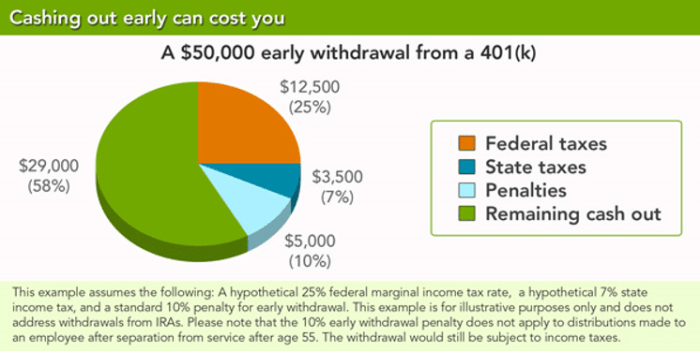Diving into the world of 401(k) withdrawal penalties, buckle up as we explore the ins and outs of this financial topic that can impact your retirement savings. Get ready for a rollercoaster ride of penalties, exemptions, and strategies to keep your funds intact.
In the following paragraphs, we’ll break down the different types of penalties, how they’re calculated, and ways to avoid getting hit with hefty fines. So, grab your notebooks and let’s dive in!
Overview of 401(k) Withdrawal Penalties
401(k) withdrawal penalties are fees imposed by the IRS on early withdrawals from a 401(k) retirement account before the age of 59 ½. These penalties are designed to deter individuals from accessing their retirement savings prematurely and encourage long-term financial planning.
Examples of Situations where Penalties Apply
- Unforeseen financial emergencies like medical bills or sudden job loss
- Using the funds for non-qualified expenses such as buying a house or paying off debt
- Changing jobs and cashing out the 401(k) instead of rolling it over into a new retirement account
Impact of Early Withdrawals on Retirement Savings
Early withdrawals from a 401(k) can have a significant impact on retirement savings in the long run. Not only are you subject to a 10% early withdrawal penalty, but you also miss out on potential growth and compounding of your investments over time. This can result in a substantial reduction in the amount of money available for retirement, affecting your financial security in the future.
Types of 401(k) Withdrawal Penalties

When it comes to withdrawing from your 401(k) early, there are several penalties you need to be aware of. These penalties can significantly impact your retirement savings, so it’s important to understand them before making any decisions.
Penalties for Traditional vs. Roth 401(k) Accounts
- Traditional 401(k) Accounts:
- Early Withdrawal Penalty: If you withdraw funds from a traditional 401(k) before the age of 59 ½, you will typically face a 10% early withdrawal penalty on top of income taxes.
- Income Tax: In addition to the early withdrawal penalty, you will also owe income taxes on the amount withdrawn.
- Roth 401(k) Accounts:
- Early Withdrawal Penalty: With Roth 401(k) accounts, you can withdraw your contributions penalty-free at any time. However, if you withdraw earnings before age 59 ½, you may be subject to a 10% penalty.
- Income Tax: Unlike traditional 401(k) accounts, withdrawals from Roth 401(k) accounts are typically tax-free as long as certain conditions are met.
Penalty Exemptions
- Hardship Withdrawals: In cases of financial hardship, such as medical expenses, disability, or education costs, you may be able to take a penalty-free withdrawal from your 401(k).
- Substantially Equal Periodic Payments (SEPP): If you set up SEPP, you can withdraw funds from your 401(k) before age 59 ½ without incurring the usual early withdrawal penalty.
- Qualified Reservist Distributions: Military reservists called to active duty for at least 180 days may be eligible for penalty-free withdrawals.
Calculation of 401(k) Withdrawal Penalties
When it comes to early withdrawals from your 401(k) account, you may face penalties that can impact your retirement savings. Understanding how these penalties are calculated is essential to make informed decisions about your finances.
Method Used to Calculate Penalties for Early Withdrawals
- Early withdrawal penalties from a 401(k) account are typically 10% of the amount withdrawn.
- This penalty is in addition to any income taxes you may owe on the withdrawal.
Breakdown of the Formula Used to Determine the Penalty Amount
- The formula for calculating the penalty amount is straightforward – it is simply 10% of the total amount withdrawn.
- For example, if you withdraw $10,000 early from your 401(k) account, the penalty amount would be $1,000 (10% of $10,000).
How the Penalty Amount is Deducted from the Withdrawal
- When you make an early withdrawal from your 401(k) account, the penalty amount is typically withheld by the plan administrator before you receive the remaining funds.
- This means that if you request a $10,000 early withdrawal, you would receive $9,000 after the 10% penalty is deducted.
Strategies to Avoid 401(k) Withdrawal Penalties
When it comes to accessing your 401(k) funds, there are smart strategies to avoid penalties and maximize your savings. By planning ahead and considering alternative options, you can prevent unnecessary fees and ensure your financial security in the long run.
Maximize Contributions
One effective way to avoid 401(k) withdrawal penalties is to maximize your contributions to the account. By saving more during your working years, you can reduce the need to tap into your retirement funds prematurely.
Utilize Loans
Consider taking out a loan from your 401(k) rather than making a withdrawal. This way, you can access funds without triggering penalties, as long as you repay the loan according to the terms set by your plan.
Explore Hardship Withdrawals
If you are facing financial hardship, explore the option of a hardship withdrawal from your 401(k). While this may still incur penalties, it can be a better alternative than a standard withdrawal if you meet the criteria.
Delay Retirement
Delaying your retirement age can also help you avoid 401(k) withdrawal penalties. By continuing to work and allowing your savings to grow, you can access your funds later without penalties.
